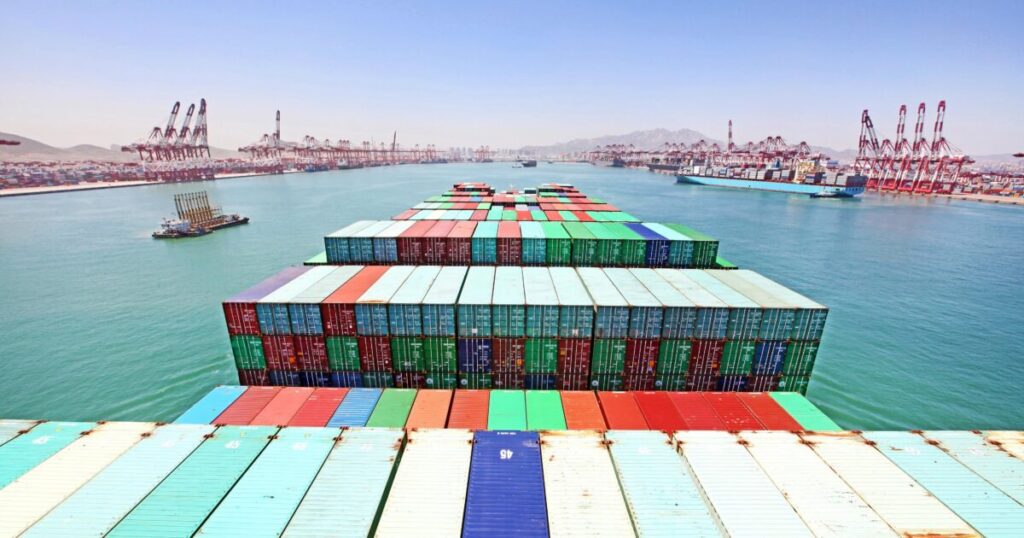- By TOP CHINA FREIGHT
- September 9, 2025
- Sea Freight, Shipping
Table of Contents
Sea shipping from China to USA is the most reliable and cost-effective way to move bulk goods for businesses. However, with multiple routes, varying costs, customs procedures, and transit time differences, choosing the right solution can be challenging. This guide provides clear insights into costs, delivery schedules, customs requirements, and strategies to optimize your supply chain.

Why Choose Sea Shipping from China to USA?
Sea freight remains the backbone of global trade between China and the United States. It is ideal for businesses handling high-volume goods, oversized cargo, or when air freight costs are prohibitive. Additionally, sea shipping offers flexible options like Full Container Load (FCL) and Less than Container Load (LCL), making it suitable for both large corporations and SMEs.
Compared to air freight, sea freight is significantly cheaper, although it takes longer. For many importers, the balance between affordability and reliability makes ocean freight the most practical choice.
What Are the Main Sea Shipping Methods?

Businesses typically choose between FCL and LCL shipping depending on their cargo size and budget.
| Shipping Method | Cargo Volume | Cost Efficiency | Transit Time | Best For |
|---|---|---|---|---|
| FCL (Full Container Load) | 20ft/40ft containers | Most cost-effective for large loads | 25–40 days | High-volume shipments, exclusive use |
| LCL (Less than Container Load) | Shared container space | Flexible, cheaper for small loads | 30–45 days | SMEs, small cargo, multiple suppliers |
How Long Does Sea Shipping from China to USA Take?
Transit times vary depending on port of origin, destination port, and chosen service.
| Origin Port (China) | Destination Port (USA) | Average Transit Time |
|---|---|---|
| Shanghai | Los Angeles | 15–18 days |
| Shenzhen | Long Beach | 16–20 days |
| Ningbo | New York | 30–35 days |
| Qingdao | Houston | 28–32 days |
However, importers should also factor in delays caused by port congestion, customs clearance, and inland trucking. Planning for buffer time ensures smoother supply chain operations.
How Much Does Sea Shipping from China to USA Cost?

Sea freight rates are influenced by multiple factors including fuel prices, carrier surcharges, container demand, and seasonal trends.
| Container Type | Average Cost (2025) | Capacity | Best Use Case |
|---|---|---|---|
| 20ft Container | $1,800–$2,500 | 28–30 CBM | Smaller loads |
| 40ft Container | $3,200–$4,500 | 55–60 CBM | Large shipments |
| LCL Cargo | $50–$80 per CBM | Varies | Small cargo |
What Customs Documents Are Required for Sea Shipping?

Smooth customs clearance is critical for avoiding delays. Typical documents include:
| Document | Purpose |
|---|---|
| Bill of Lading (B/L) | Proof of cargo ownership and shipment details |
| Commercial Invoice | Declares value of goods for customs duties |
| Packing List | Detailed breakdown of goods |
| Certificate of Origin | Verifies country of manufacture |
| Importer Security Filing (ISF) | Required by U.S. Customs before cargo departs |
Having these documents prepared and verified prevents unnecessary hold-ups at ports.
What Are the Pros and Cons of Sea Shipping?
| Pros | Cons |
|---|---|
| Cost-effective for bulk shipments | Longer transit times |
| Wide capacity options | Possible port congestion delays |
| Suitable for heavy/oversized cargo | Higher risk of damage compared to air freight |
| Environmentally friendlier than air freight | More complex customs process |
Understanding these trade-offs helps businesses select the right mode for their specific cargo.
Case Study: Reducing Costs with LCL Shipping

A mid-sized U.S. retailer importing home décor from Shenzhen faced high air freight charges. By consolidating shipments with other importers using LCL sea freight, they reduced shipping costs by 40%. While transit time increased by 10 days, early planning allowed them to maintain steady inventory without affecting sales. This demonstrates how strategic choices in sea shipping can significantly reduce expenses while keeping supply chains stable.
How to Choose the Right Freight Forwarder?
Working with experienced freight forwarders simplifies the sea shipping process. A good partner provides:
- Competitive sea freight quotes
- Assistance with customs clearance
- Cargo insurance options
- Real-time tracking and updates
- Flexible solutions for FCL and LCL
Additionally, established freight forwarders often negotiate directly with carriers, ensuring better rates and smoother scheduling for their clients.
How to Save on Sea Shipping Costs?
Securing space ahead reduces risks of peak season surcharges
Efficient packing maximizes container use
FCL becomes cheaper than LCL for cargo over 15 CBM
Selecting efficient ports reduces inland trucking expenses
They bundle multiple clients’ shipments, lowering per-unit costs
Sea vs Air Freight: Which Is Better?
| Factor | Sea Freight | Air Freight |
|---|---|---|
| Cost | Much lower | High |
| Speed | Slower (15–35 days) | Fast (3–7 days) |
| Cargo Size | Large, bulky | Small, urgent |
| Customs Process | More detailed | Simplified |
| Environmental Impact | Lower emissions per ton | Higher emissions |
Therefore, sea freight is the preferred option for businesses prioritizing cost, while air freight suits urgent or high-value goods.
Conclusion
Sea shipping from China to USA remains the most practical solution for bulk cargo, offering cost efficiency, flexibility, and reliability. Although transit times are longer compared to air freight, proper planning, document preparation, and working with experienced freight forwarders ensure smooth operations. Businesses that understand container costs, customs procedures, and logistics planning can significantly reduce overall shipping expenses while maintaining supply chain stability.
Need a Shipping Quote?
If you want expert guidance and peace of mind, our team is ready to assist.
TJ China Freight offers tailored solutions to help businesses of all sizes ship more reliably from China.

FAQs
Q1:Can I ship small parcels by sea from China to USA?
Yes, using LCL sea freight. It allows small shipments to share container space, making it affordable for low-volume importers.
Q2:What is the cheapest way to ship from China to USA?
Sea freight is the cheapest method, especially for large volumes. Choosing FCL or LCL depending on cargo size further reduces costs.
Q3:Do I need cargo insurance for sea freight?
Yes, it is recommended. Cargo insurance protects against loss, theft, or damage during long sea shipping journeys.
Q4:How early should I book sea shipping?
Book at least 2–3 weeks in advance, especially during peak seasons, to secure space and avoid higher costs.
Q5:Are customs duties included in sea freight quotes?
No, customs duties are separate. Importers must calculate them based on product type, declared value, and tariff classification.
